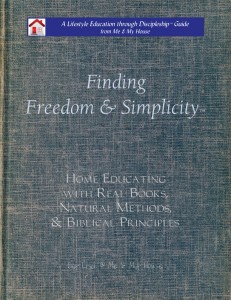I’ve been corresponding with a mom about high school, and decided to share here with you some of the things I’m sharing with her. In particular, how we map-out what we cover in high school, since we don’t use textbooks and laid out (by others) courses. We aren’t so much focused on “college prep” for its own sake, but rather on preparing our children for adulthood and making an impact for Christ on culture. But that doesn’t mean our children that choose to go to college aren’t prepared. They have done very well. We adjust each area below as needed for each child depending on their strengths and gifts and interests, but this is pretty much what we do for all, just changing emphasis a bit.
Bible: Survey, key doctrines, how to study, and life principles/wisdom application.
Apologetics/ Worldview: very important preparation for young Christian adults. We use several resources that I scope out on: Knowing What you Believe, Coming to Beliefs, Reaching Others, Exposing False Beliefs.
Governments: manhood/womanhood, family, church gov types, local, state and national gov – Constitution, helping in politics, becoming informed and involved, etc.
History: We don’t do a year of world and a year of American, but 4 (+) years of Ancient, Early Church-Middle Ages, Reformation – Founding of America, -> America and World now, including geography.
Economics: Household (budgeting, personal/family finances), Business finances, World economics.
Science: Creation Foundations, Earth: Surface (Geology, Oceanography), Sky (Weather/Climate), Space (Astronomy); Physical: Physics, Chemistry, Technology; Life/Biology: Plant, Animal, Man.
Health: Nutrition & Exercise, Disease & Health Care, Human Development, Physical Exercise program.
Language: Reading (research and study skills, literature), Writing (Grammar, Vocabulary, Composition), Public Speaking and Debate, Logic, Foreign Language.
Math: typical Algebra, Geometry, etc. Applied Math (Family Finances above).
Practical Arts: includes Home Management, Life Skills, Business Skills (General), (specific) Occupational Skills.
Fine Arts: Music, Visual Arts, Performance Arts, Home Arts.









 A while back I reviewed
A while back I reviewed 



